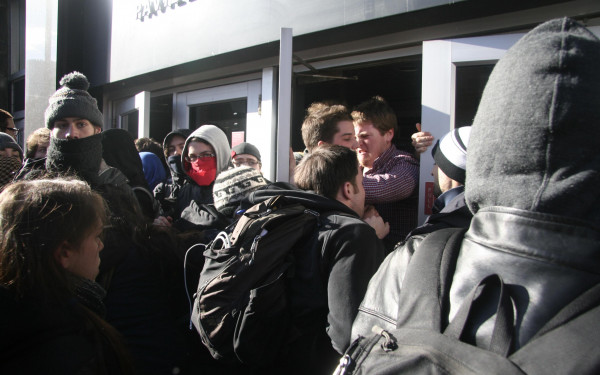Student Sues Montreal Police
Activist Calls for Support From CSU as Political Profiling Lawsuit Looms
Katie Nelson says Montreal police have been treating her differently since she filed a lawsuit against them last week.
“I [saw] a cop the other night, and I haven’t seen any since [the lawsuit] came public, and he was a cop from the strike,” she told The Link last week, referring to last year’s Quebec student strikes which saw a clash between thousands of protesters denouncing increases to university tuition and an increasingly heavy-handed police force.
“[Police] were harassing these kids from France, so I was videotaping ‘cause I felt like I should, and they were very interested [in the case].”
But what the officers seemed concerned with seemed rather odd to her.
“They were very curious as to whether I was Democrat, which was really weird,” she said.
While she maintains she was treated well, one officer “told the other cop that, ‘you know, Katie’s kind, but she makes us look bad,’” Nelson said.
Nelson, a first-year philosophy student at Concordia, filed a lawsuit against the City of Montreal and the Service de police de la Ville de Montréal last Tuesday. She alleges she has been the victim of harassment at the hands of police officers since becoming involved in the student strikes last year.
Having received 33 tickets in the last 15 months—amounting to over $6,500 worth of fines—she also argues police are unfairly targeting her, with charges against her ranging from swearing in public, jaywalking amidst a marching protest of thousands of people, and spitting on the ground.
Nelson and her attorney—constitutional lawyer Julius Grey, who is fighting the case pro-bono—are asking for $24,000 in damages.
“The whole goal of this is not to win money, but to set a legal precedence for, I guess, radicals or any activists, really,” she said.
“We’re trying to set legal precedence against political profiling, which is really huge in Canada and something I think a lot of [activists] have been working [on] for a while,” she continued.
“That would affect people in Toronto, that would affect people in Vancouver, in Alberta, where all these activists that are being persecuted for their beliefs.”
But as to why more cases have not been brought forward in Quebec courts denouncing the alleged actions of the SPVM, Nelson, who considers herself an anarchist, says it’s hard for fringe groups to trust the rest of society.
“I come from a community that doesn’t agree with anything in the world,” she said.
“Anarchists are really cautious before they use the justice system or the media as tools, and I think that’s why we don’t see more legitimate ways to fight against the police.
“I think I see a lot of tactical and really strong organizing underground, but not in the conventional methods of society.”
A Matter of Pride
Nelson, who is originally from Alberta, only moved to Montreal last May.
Though it was the height of the student strike, Nelson says that her problems with police only truly began mid-summer, after she created a Facebook group compiling information on officers that she says were engaging in police brutality.
“We created a group that would provide every piece of evidence that somebody needed so a complaint wouldn’t just go away,” she said.
“That pissed cops off, because we were taking pictures of them with […] their badge number.
“I think that’s when they started to become more personal about it. I would get a ticket for everything.”
According to Nelson, who has no charges of violent behaviour against her, police began ticketing her for whatever they could, such as jaywalking and uttering swear words.
“It was kind of like they lost a little bit of pride,” she recalled. “They tried really hard to put on criminal charges or intimidation charges or whatever and they didn’t work, and so instead they went after anything else.
“They couldn’t just let it go.”
Because of the number of tickets she’s received, the majority of Nelson’s charges that have yet to see a date in municipal court have been compiled and will be collectively ruled upon on Jan. 10, according to Nelson.
But with her upcoming case before Quebec’s Superior Court, that may change.
“I don’t think they can even come to a conclusion because it’s ongoing in Superior Court, but it’s pretty clear with the tickets—and the cops that have given me the tickets—that something else is going on, and I think that the prosecutor’s going to look at that,” she said.
“On top of that, a lot of the tickets are invalid to begin with; there’s no possible way I could even be guilty because they’re not valid tickets.
“I don’t expect them to come to a decision […] but if I was guilty I imagine we would appeal it.
“I’m not a lawyer or anything, but I feel if they ruled me guilty, it would give us more amp in the lawsuit.”
“The important thing is that the CSU passed a motion last March against the SPVM and nobody really followed through with it,” she said, adding she wants Prunty’s original letter released as well.
“I think students should see it, and I think the media should see it too, because it shows there’s still solidarity within students in schools,” she said.
“We need to show students there’s someone backing them for people to keep stepping forward. It’s not just me—it’s a lot of Concordia students that were attacked.”
CSU Issues
Her lawsuit may be ongoing, but Nelson still has other things on her plate. The 21-year-old is beginning classes at Concordia this semester.
“I don’t know Katie Nelson, and I have only the vaguest awareness of her situation; I don’t want to comment because it’s all before the courts,” said Concordia President Alan Shepard.
But Shepard did say he is not a fan of the university name being “broadened to a situation where Concordia really had nothing to do with it.”
Though a Montreal Gazette story originally identified Nelson as a soon-to-be student, much of the subsequent press identified Nelson solely as a current Concordian.
As for the Concordia Student Union, Nelson says the CSU has some promises to keep.
In an emergency session on March 28, the CSU voted unanimously to publicly denounce municipal bylaw P-6, which requires that a route be provided to police at least 24 hours before all protests set to take place on public property, and further restricts the wearing of clothing that hides one’s face. Failure to comply with the bylaw could result in the protest being declared illegal.
While not widely used over the course of the student protests against tuition increases last year, SPVM officers have escalated their use of the bylaw since February—often detaining protesters en masse by corralling and boxing in the entire group in a tactic known as kettling.
While the vote was made public, a letter that accompanied the original motion decrying the SPVM’s tactics has not yet seen wide release. The letter was written by VP Sustainability Benjamin Prunty, who served as a CSU arts and science councillor at the time.
While both Prunty and CSU President Melissa Kate Wheeler say there is no specific reason that the letter was not released, Wheeler claimed the responsibility lay with last year’s council and may have been overshadowed during the transition.
But her executive is not done with P-6, she continued.
“What we’ll have to do is continue to discuss it with our council and see what direction they’d like to take and then we’ll honour that and take that direction,” said Wheeler. Though with all resolutions being binding, they must respect the decision of last year’s council, she added.
As for Nelson, who has received multiple tickets for P-6 infractions, she says she wants results.
“The important thing is that the CSU passed a motion last March against the SPVM and nobody really followed through with it,” she said, adding she wants Prunty’s original letter released as well.
“I think students should see it, and I think the media should see it too, because it shows there’s still solidarity within students in schools,” she said.
“We need to show students there’s someone backing them for people to keep stepping forward. It’s not just me—it’s a lot of Concordia students that were attacked.”





_600_375_90_s_c1.jpg)

